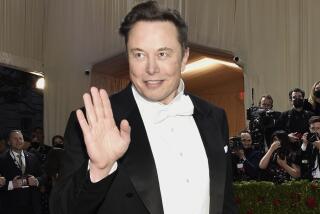Clean-Living Saudi Prince Has Got His Own
- Share via
DUBAI, United Arab Emirates — He was born into one of the world’s richest families, the ruling Al-Sauds of Saudi Arabia.
But billionaire Prince al-Waleed bin Talal has set himself apart from many of the rest of his clan. He has made a fortune in just 15 years--by working for it.
Although his rise to become one of the world’s richest men is not a rags-to-riches tale, al-Waleed nevertheless built his wealth on a loan of just $300,000. And he had to borrow that from a bank because his wealthy father wouldn’t lend it to him.
Today, his global empire is worth an estimated $11.3 billion. Among his holdings are stakes in Apple Computer, Trans World Airlines, Saks Fifth Avenue stores, the Fairmont and Four Seasons hotel chains, the Donna Karan fashion house and Planet Hollywood restaurants.
Al-Waleed, 41, a nephew of King Fahd born of a Lebanese mother, says his strategy is simple: Find good companies that are undervalued because of temporary financial or management problems.
“If something is worth $4 billion but going for $1 billion, we buy,” al-Waleed said in a rare telephone interview from Paris, which he visits often.
For his daring but successful strategy, Forbes magazine named al-Waleed in July as the world’s second-most creative and successful businessman. Microsoft Chairman Bill Gates was ranked first.
The prince first turned heads when he bailed out New York-based Citibank in 1991. At the time, the bank was in financial straits because of bad Third World debts, and investors were staying away.
Al-Waleed ignored the naysayers and pumped $800 million into what looked like a losing proposition. Instead, the money turned Citibank’s fortunes around, and his investment soared eightfold in value.
In 1994, he was the white knight who rescued Euro Disney by buying a 24% stake in the debt-ridden theme park outside Paris. That brought him a fortune too.
*
“He had a number of high-profile contrarian successes, and that’s what draws attention. It lends an aura to his astuteness,” said Daniel Kunstler, a San Francisco-based financial analyst at J.P. Morgan Securities.
Al-Waleed says that with each investment, he asks himself: “Will it be profitable?” But there are certain industries the devout Muslim shuns, such as alcohol, gambling and tobacco, which are either forbidden or frowned on by Islam.
Even in a country awash in oil wealth, al-Waleed stands out for his riches. And in a royal family whose thousands of princes are known for sometimes blowing their allowances on women, gambling and alcohol, he stands out for his reputation for clean living.
The twice-divorced father of two is a fitness fanatic who doesn’t smoke, drink, womanize or gamble, acquaintances say.
He has a small army of financial consultants on his payroll, but is not content with letting them look after the details.
“The prince is the most thorough businessman I’ve ever met,” said Vernon Casson, a lawyer who worked with the prince on the Euro Disney purchase. “He knows every aspect of every deal he invests in. He does his homework, and when he doesn’t know something, he asks a million questions.”
Despite a heavy workload, al-Waleed makes time for his 15-year-old daughter, Reem, and 19-year-old son, Khaled. They have lunch together every day and spend summer vacations aboard their 282-foot yacht, Kingdom, named after his flagship company.
Al-Waleed’s other indulgences include two private jets, more than 250 cars and a $20-million sports complex with an Olympic-size swimming pool and bowling alley.
Al-Waleed spends weekends in his high-tech desert encampment outside the Saudi capital, Riyadh, where the large television sets, faxes and computers appear out of place among the sand dunes.
There, when not working, he often sheds protocol and plays soccer with his retinue of about a dozen security guards, or sits with them cross-legged on a carpet in large camel-hair tents to share a simple, traditional meal of rice and lamb.
Back in the palace, he has a 12-man team led by religious scholars who screen dozens of requests every day for financial aid from needy Saudis. He has given out $200 million this year alone, said a close aide, who spoke on condition of anonymity.
*
Tales of al-Waleed touring the desert in a convoy and doling out cash to tribesmen are talked about around the country. To avoid repeat donations, the prince makes sure the social security numbers of recipients are noted in the laptop computers carried by his aides.
That charity has made him one of the royal family’s most popular members but also has prompted charges of buying influence.
Some people say al-Waleed inherited his independent spirit from his father, who caused a scandal when he fled to Egypt in 1962 at a time of tense Saudi-Egyptian relations and called for a more open political system in autocratic Saudi Arabia.
He was eventually allowed to return, but the episode unofficially barred him and his children from a role in government. That may have inspired al-Waleed to make his mark in business.
When asked whether he sees himself first as a businessman or as a prince, al-Waleed hesitated.
“The first one I earned; the second I inherited. And I’m equally proud of both,” he said. “It is God’s blessing.”
More to Read
Inside the business of entertainment
The Wide Shot brings you news, analysis and insights on everything from streaming wars to production — and what it all means for the future.
You may occasionally receive promotional content from the Los Angeles Times.










